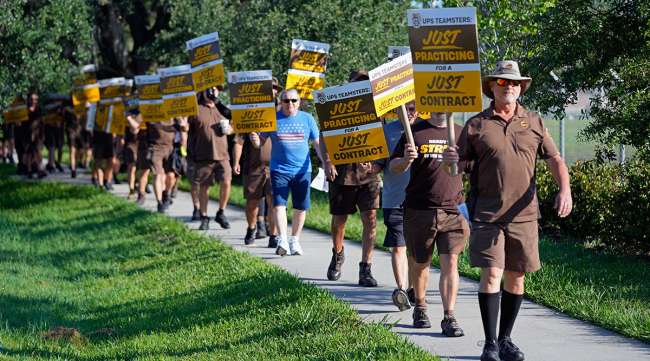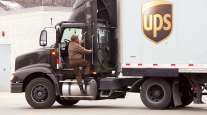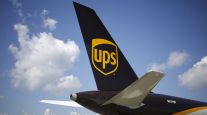Senior Reporter
UPS-Teamsters Negotiations Remain Stalled

[Stay on top of transportation news: Get TTNews in your inbox.]
UPS Inc. on July 11 pushed to Aug. 8 the release date for its second-quarter financial report, a week after its current labor contract with the International Brotherhood of Teamsters is set to expire. The company did not say that the ongoing labor negotiations were a factor in the move, but the negotiations are being closely watched around the transportation industry.
The contract covers 340,000 UPS workers, including many drivers, and the contentious nature of negotiations for a new agreement — which were put on hold after the July Fourth holiday — have industry analysts raising alarm about the company’s importance to the U.S. economy.
“We certainly are encouraging the parties to return to the table,” said Jonathan Gold, vice president of supply chain and customs policy at the National Retail Federation. “They certainly were making good progress during the negotiations. We think it’s time to get back and finish the deal, before the end of the contract.”
Gold added, “I think they’re close, and they can spend the time in negotiations. It’s important to get this done, without a disruption.”
UPS workers have vowed to strike if a new deal is not reached by the deadline. Transportation and logistics experts contracted by Transport Topics say a work stoppage in August would have a serious impact on the U.S. economy, as UPS workers transport an estimated 25 million packages a day, valued at 6% of the nation’s gross domestic product.
The breakdown in negotiations arrived after a July 1 Teamsters tweet indicated that a tentative agreement was in place on three economic issues involving wages for a specific tier of drivers, overtime work on scheduled days off and recognition of Martin Luther King Jr. Day as a full company holiday. By July 5, each side was accusing the other of leaving the negotiations.
Take a look at just a few of the part-timers who are proud to be UPSers.
We offer industry-leading pay and benefits and provide many opportunities for growth and development, and we intend to keep it that way. Hear why UPS is a great employer directly from our employees. — UPS (@UPS) July 8, 2023
“We have not walked away, and the union has a responsibility to remain at the table,” Atlanta-based UPS said in a July 5 statement. “Refusing to negotiate, especially when the finish line is in sight, creates significant unease among employees and customers and threatens to disrupt the U.S. economy. Only our nonunion competitors benefit from the Teamsters’ actions.”
That same day, the union issued a 4 a.m. tweet charging that UPS had left the negotiating table. “UPS had a choice to make, and they have clearly chosen to go down the wrong road,” Teamsters General President Sean O’Brien said in a statement.
With General President Sean M. O’Brien on a boisterous practice picket line in New Jersey this morning, additional practice picketing actions are underway this week in...
📍Northern California
📍Montana
📍Illinois
📍Pennsylvania
📍Rhode Island
📍Florida pic.twitter.com/mvjo2Xsul3 — Teamsters (@Teamsters) July 13, 2023
More recently, O’Brien told Bloomberg News he’s ready to return “whenever [UPS] picks up the phone and calls us,” he said, adding, “The majority of the negotiations have been completed, and now it is strictly economics.”
Acting Labor Secretary Julie Su said the two sides are making good progress and expressed optimism that a deal could be reached. “The collective bargaining process works. It is a healthy process. Sometimes it takes time; sometimes it is contentious, and it isn’t always pretty, but at the end of the day, it leads to results that are beneficial for workers, industry and America,” Su said July 12 during an appearance at a monthly news conference hosted by Port of Los Angeles Executive Director Eugene Seroka that typically features industry guests. “The leadership of those two parties, UPS and the Teamsters, have been at the table and also resolved some very hard issues.”
Want more news? Listen to today's daily briefing above or go here for more info
The union maintains that efforts by UPS workers during the COVID-19 pandemic to keep supply chains moving earned them the right for greater consideration in a new labor contract.
UPS rival FedEx is advising UPS customers to establish an account now if they want to plan for a potential strike later in the summer, as it will prioritize shipments for existing customers should one take place.
UPS Inc. ranks No. 1 on the Transport Topics Top 100 list of the largest for-hire carriers in North America. FedEx ranks No. 2.




